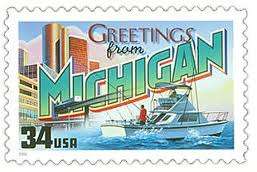Online Gaming Bill Introduced in Michigan
It has been two and a half years since New Jersey became the third state in the United States to launch a regulated online gambling industry. To the great disappointment of millions of online poker fans in the U.S. – not to mention the internet poker operators yearning to get back into the U.S. – no other state has legalize online gambling, poker or otherwise, since. Michigan State Senator Mike Kowall (15th District) would like Michigan to be the fourth state where people can have the freedom to play poker from the comfort of a bean bag chair in their mother-in-law’s guest room. On Thursday, April 14th, Senator Kowall introduced SB 889, the “Lawful Internet Gaming Act.” Joining him as co-sponsors of the bill, which was referred to the Committee on Regulatory Reform, are Senators Curtis Hertel Jr., Rebekah Warren, Bert Johnson, and Marty Knollenberg.
Section 2 of SB 889 explains the reason for the bill, specifically mentioning consumer protection, government revenue, and jobs:
The legislature finds that the Internet has become an integral part of everyday life for a significant number of residents of this state, not only in regard to their professional lives, but also in regard to personal business and communication. Internet wagering on games of chance and games of skill is a core form of entertainment for millions of individuals worldwide. In multiple jurisdictions across the world, Internet gaming is legal, regulated, and taxed, generating billions of dollars in revenue for governments.
In an opinion dated September 20, 2011, the United States Department of Justice reversed its previous interpretation of 18 USC 1084, commonly referred to as the federal wire act, allowing states, subject to certain restrictions, to legalize and regulate Internet gaming and capture the revenue for the benefit of state governments.
In order to protect residents of this state who wager on games of chance and skill through the Internet and to capture revenues and create jobs generated from Internet gaming, it is in the best interest of this state and its citizens to regulate this activity by authorizing and establishing a secure, responsible, fair, and legal system of Internet gaming that complies with the United States Department of Justice’s September 2011 opinion concerning 18 USC 1084.
Section 5 of the bill makes it clear that Michigan would be a potential participant in interstate online gambling:
The division may enter into agreements with other gaming entities, including foreign entities, to facilitate, administer, and regulate multijurisdiction Internet gaming to the extent consistent with state and federal laws and the laws of any foreign jurisdiction. For this purpose, the division may enter into multijurisdictional agreements with other states and foreign jurisdictions.
And then, two paragraphs later, the door is kept ajar for anyone from anywhere where online gaming is legal to possible play on Michigan sites, even without a compact with their jurisdiction:
Notwithstanding anything else in this act, a wager may be accepted from an individual who is not physically present in this state if the division determines that the wager is not inconsistent with federal law or the law of the jurisdiction, including any foreign nation, in which the individual is located or that the wagering is conducted under a multijurisdictional agreement to which this state is a party that is not inconsistent with federal law.
Of course, the whole “not inconsistent with federal law” thing is likely to be a sticking point, but the possibility of accepting customers from other countries without a “multijurisdictional agreement” as long as there are no laws against it is at least baked into the bill.
 As for some of the specifics of the bill, only licensed Michigan casinos and “federally recognized” Native American tribes in Michigan that have gaming licenses may apply for online gaming licenses. Any tribe that wants to operate a site “waives its sovereign immunity with respect to conducting gaming under this act and paying fees and taxes imposed under this act.”
As for some of the specifics of the bill, only licensed Michigan casinos and “federally recognized” Native American tribes in Michigan that have gaming licenses may apply for online gaming licenses. Any tribe that wants to operate a site “waives its sovereign immunity with respect to conducting gaming under this act and paying fees and taxes imposed under this act.”
Application fees are $100,000 and are non-refundable. The actual licensing fee is $5 million, but does serve as an advance payment on gaming taxes owed in the future. Those taxes would amount to 10 percent of gross gaming revenue. Licenses are good for five years and are renewable for another five years.
The minimum age for customers, as expected, is 21-years old. Initially, only people within Michigan state borders can play on the state’s online gaming sites, but as we saw, there is the possibility of market expansion outside the state.
No specific standards for things like fraud prevention, problem gambling protection, cheating detection, and the like are detailed in the bill, but the bill does say that the gaming commission can (and almost certainly will) develop these standards and that the gaming operators must figure out ways to uphold them.



















COMMENTS